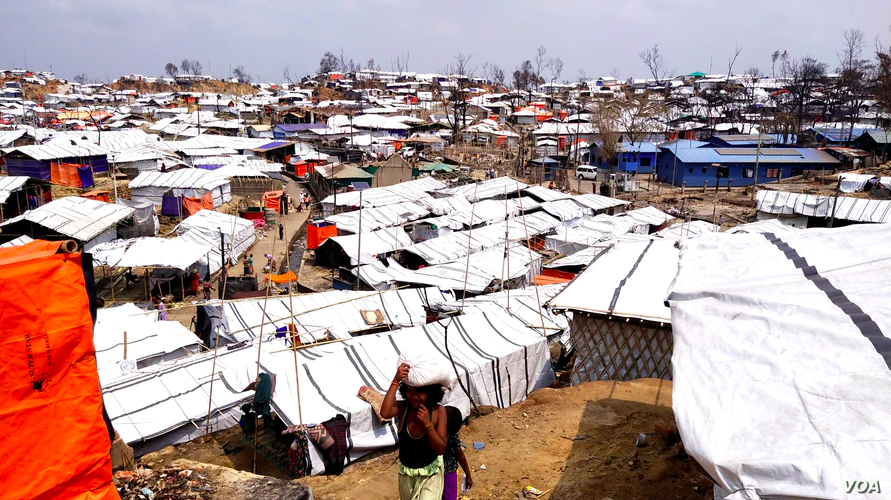Updates & Press
Featured | April 16, 2021
Weekly Humanitarian News Digest – April 16
Author | MedGlobalComms

Each week, we highlight the latest news related to the humanitarian and health crises in our countries of operation: Bangladesh/ Myanmar, Colombia/ Venezuela, Gaza/ Palestinian Territories, Lebanon, Pakistan, Sudan, Syria, and Yemen. For more frequent updates, make sure to follow us on Facebook, Instagram, and Twitter.
Cover Image: VOA
Latest News for April 9 – April 16, 2021
Bangladesh/ Myanmar
Rohingya refugees in Cox’s Bazar are reportedly living in fear for their safety after dozens of fires have broken out in camps in recent weeks. The one million Rohingya refugees in Cox’s bazar live in overcrowded camps composed of highly flammable bamboo shelters. On March 22, a large fire in Balukhali camp killed 15 people and destroyed 17,000 shelters, leaving 48,000 refugees homeless. Since then, at least 32 more fires have been reported in the camps, including a fire on April 2 that killed three people and destroyed 20 shops. (Voice of America)
Colombia/ Venezuela
Multiple Colombian cities have initiated total lockdowns as COVID-19 infections and deaths surge. On Sunday, the Ministry of Health reported 17,483 new infections, a nearly eightfold increase from early March. The spike in cases overwhelmed the health systems in Medellin and Barranquilla where authorities implemented 24-hour curfews. A full lockdown has not been ruled out in Colombia’s capital as Bogota’s health secretary warns that the health system will be pushed to its limit in the next few days. (Colombia Reports)
Gaza/ Palestinian Territories
Gaza is reporting record numbers of severe and critical cases of COVID-19. In the last three weeks, severe and critical cases have more than tripled. Health officials estimate that 80% of new cases are caused by the UK variant of the virus, which is highly transmissible and was first detected in March. Less than one percent of Gaza’s population has been vaccinated so far. (The New York Times)
Lebanon
Widespread food insecurity, poverty, and rising COVID-19 cases are pushing Lebanon towards a national humanitarian emergency. Food prices have quadrupled over the past year and a majority of Lebanese households now live below the poverty line. More than 90% of Syrian refugees are suffering from extreme poverty and have limited support from the government. Refugees have been increasingly blamed for the country’s problems and the risk of widespread violence grows as the crisis worsens. (ReliefWeb)
Pakistan
On Monday, anti-French protests in Pakistan blocked roads and disrupted oxygen supplies for several hospitals. A senior health official in Punjab, Pakistan’s most populous province, said that the shortages created a crisis for COVID-19 patients that require constant access to medical oxygen. He called on protestors to not block roads for ambulances and hospital visitors. Pakistan is currently experiencing a third wave of COVID-19 infections and has limited supplies of vaccines. (France 24)
Sudan
According to UNHCR, at least 1,800 people have fled violence in Sudan’s Darfur region into neighboring Chad. More than 200 people have been killed in clashes between Massalit and Arab tribe members. The refugees in Chad reported targeted attacks on refugee sites and the destruction of homes and property by armed groups. The UN has condemned the violence and called on all groups to disarm and allow for independent investigations. (Al Jazeera)
Syria
De facto authorities in northeast Syria have imposed a 10-day lockdown in response to a surge in COVID-19 cases. Crossing points connecting the northeast with the rest of Syria will also be closed. The head of the regional health system has warned that the northeast has reached a critical period as new cases overwhelm hospitals and clinics. There have been 12,437 cases and 428 deaths reported in the northeast, but the real numbers are believed to be much higher. (Associated Press)
Yemen
Yemen’s committee overseeing the COVID-19 crisis has urged the government to declare a public health state of emergency over the rising number of COVID-19 cases and deaths. The committee reported that there have been more than 5,000 cases and 1,000 deaths since the beginning of the pandemic. The actual numbers are likely much higher since testing is extremely limited and no figures are available from cities under the control of Ansar Allah. Though Yemen received its first shipment of 360,000 vaccines in late March, misinformation and conspiracy theories have fueled anti-vaccine fears. Many people are concerned that vaccines are unsafe and have said that they will refuse them. (Middle East Eye)


